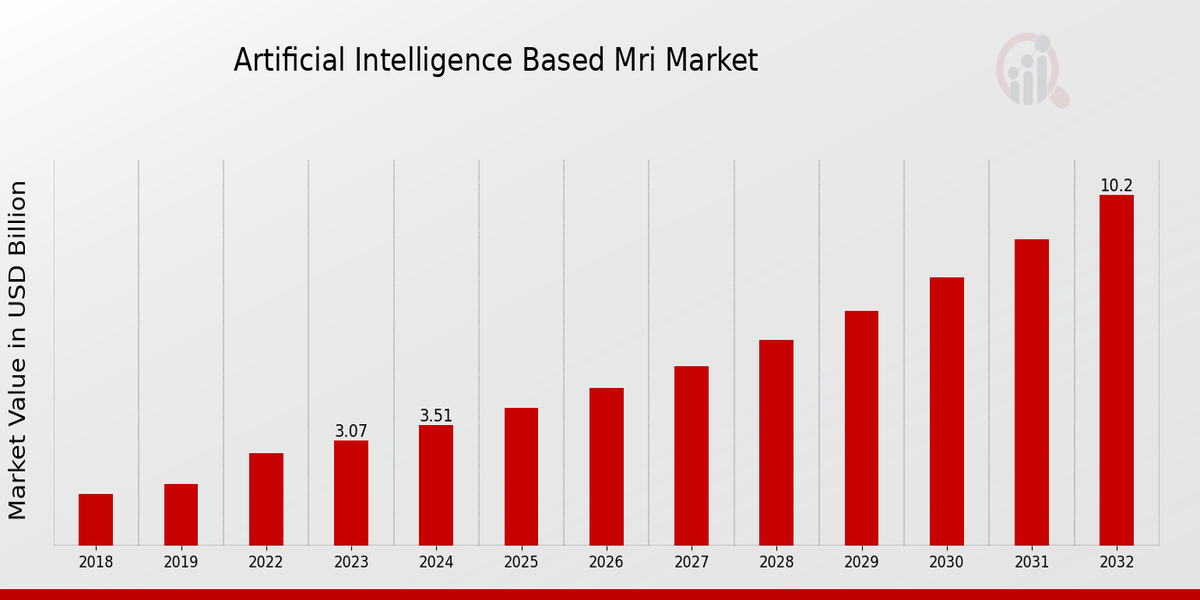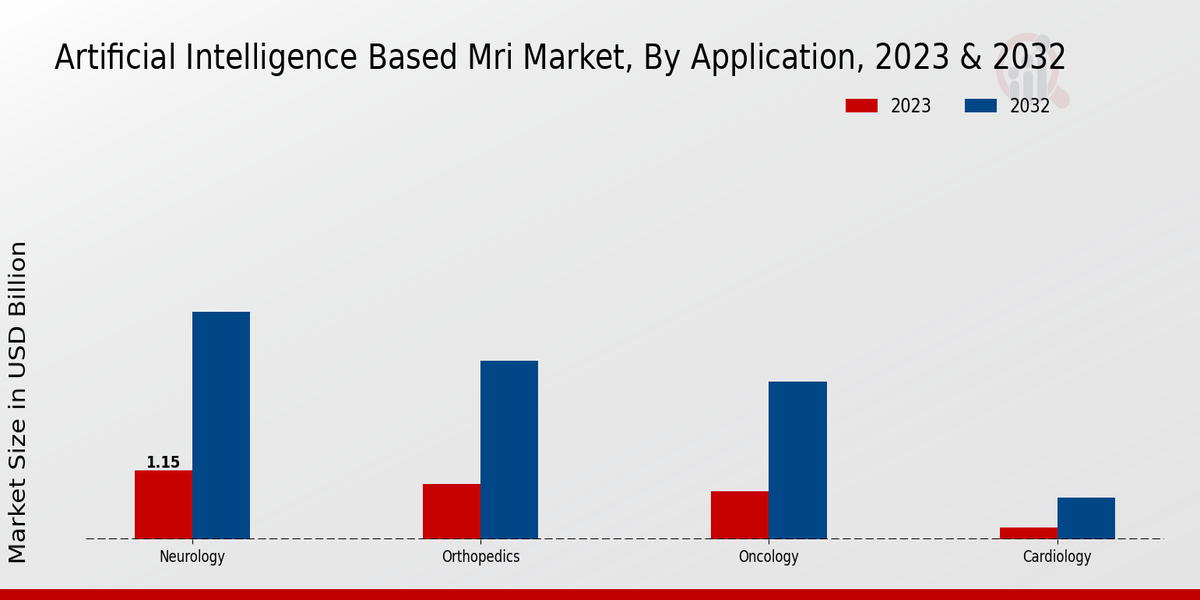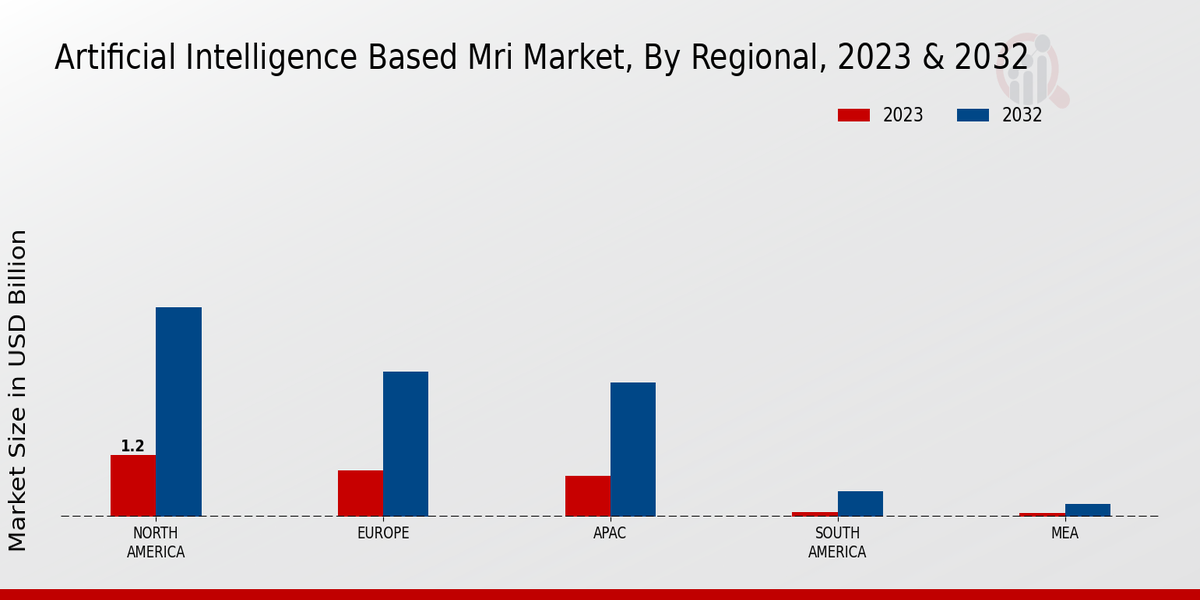Global Artificial Intelligence Based MRI Market Overview:
As per MRFR analysis, the Artificial Intelligence Based MRI Market Size was estimated at 2.69 (USD Billion) in 2022. The Artificial Intelligence Based MRI Market Industry is expected to grow from 3.07(USD Billion) in 2023 to 10.2 (USD Billion) by 2032. The Artificial Intelligence Based MRI Market CAGR (growth rate) is expected to be around 14.27% during the forecast period (2024 - 2032).
Key Artificial Intelligence Based MRI Market Trends Highlighted
The artificial intelligence-based MRI market is experiencing significant growth, driven by advancements in imaging technology and increasing healthcare demands. The integration of AI in MRI systems enhances diagnostic accuracy and efficiency, allowing for quicker image processing and analysis. This leads to improved patient outcomes and streamlined workflow in healthcare facilities. Additionally, the rising prevalence of chronic diseases and neurological disorders necessitates the need for enhanced imaging techniques, further propelling market demand. Several opportunities exist within this evolving market that stakeholders can explore.The development of AI algorithms tailored for specific imaging tasks can lead to groundbreaking innovations. Collaborations between technology companies and healthcare providers can facilitate the introduction of cutting-edge solutions. Moreover, as telemedicine and remote patient monitoring become more prevalent, there's a growing need for AI-driven tools that support virtual consultations and efficient follow-ups. Expanding the application of AI in MRI to include diverse medical fields such as oncology, cardiology, and ortho pedics can also create untapped market segments. Recent trends indicate an increasing focus on the regulatory landscape surrounding AI in medical imaging.Efforts to standardize AI algorithms and ensure their safety and efficacy are shaping the market's future. Furthermore, ongoing investments in research and development are leading to new products that can adapt to varying patient needs. There's also a noticeable shift towards real-time data analytics, which allows clinicians to make informed decisions based on immediate imaging results. Overall, these developments underscore the dynamic nature of the artificial intelligence-based MRI market, reflecting a robust trajectory toward innovation and enhanced healthcare delivery.

Source: Primary Research, Secondary Research, MRFR Database and Analyst Review
Artificial Intelligence Based MRI Market Drivers
Advancements in AI Technology
The Artificial Intelligence Based MRI Market Industry is witnessing significant advancements in artificial intelligence technologies that are transforming the medical imaging landscape. Increasingly sophisticated algorithms and machine learning models are enhancing the capabilities of MRI systems, enabling them to analyze complex medical data with unprecedented accuracy and speed. These advancements culminate in the development of AI-driven MRI applications that not only improve diagnostic capabilities but also streamline workflow efficiencies for healthcare providers.The integration of AI with MRI systems allows for automated image reconstruction, segmentation, and even anomaly detection, which reduces the burden on radiologists and minimizes human error. The rising demand for early disease detection and improved patient outcomes further fuels investment in AI technologies within the market. As AI solutions continue to evolve, they promise to deliver deeper insights into patient conditions and facilitate personalized medicine approaches.Furthermore, the collaboration between technology companies and healthcare institutions in developing AI tools emphasizes the potential for innovation in the Artificial Intelligence Based MRI Market Industry. With these advancements paving the way for more efficient procedures and enhanced diagnostic capabilities, the market is set for substantial growth in the coming years.
Increased Demand for Diagnostics
There is a growing demand for accurate and timely diagnostics in the medical field, which is significantly driving the Artificial Intelligence Based MRI Market Industry. Patients and healthcare providers alike seek higher-quality imaging solutions that lead to faster diagnostic processes and better treatment decisions. Advanced AI-driven MRI systems meet this demand by providing high-resolution images and superior analysis capabilities. The ability of AI to assist in identifying even subtle changes in MRI scans ensures that critical conditions can be diagnosed earlier, improving patient outcomes and survival rates.The increasing emphasis on preventive care in healthcare systems further supports the expansion of this market, as AI-based MRI technologies facilitate proactive health monitoring.
Growing Investment in Healthcare Technology
Investment in healthcare technology, particularly in artificial intelligence, is rapidly increasing and is a significant driver of the Artificial Intelligence Based MRI Market Industry's growth. As healthcare operators seek to optimize operations and manage costs, they are turning to innovative AI solutions to enhance the capabilities of MRI machines. Government initiatives aimed at digital transformation in the healthcare sector also support this trend.The infusion of capital into research and development for AI-based imaging solutions fosters innovation, leading to the introduction of next-generation MRI technologies that improve diagnostic capabilities and efficiency. This ongoing investment helps position AI-driven MRI solutions as essential tools in the modern healthcare landscape.
Artificial Intelligence Based MRI Market Segment Insights:
Artificial Intelligence Based MRI Market Application Insights
The Artificial Intelligence Based MRI Market shows a strong potential for growth, particularly in its Application segment, which encompasses areas such as Neurology, Orthopedics, Oncology, and Cardiology. The market is valued at approximately 3.07 USD Billion in 2023, reflecting the increasing integration of AI technology in medical imaging. Among the various applications, Neurology holds a majority position, valued at 1.15 USD Billion in 2023, and is expected to reach 3.79 USD Billion in 2032. This segment's prominence stems from the rising prevalence of neurological disorders, making accurate and efficient imaging essential for diagnosis and treatment planning.Following Neurology, Orthopedics ranks second with a valuation of 0.92 USD Billion in 2023, anticipated to grow to 2.98 USD Billion by 2032, driven by the expanding aging population and corresponding orthopedic issues. The increasing demand for precise imaging in both pre-operative and post-operative assessments reinforces the significance of this application. Oncology, valued at 0.8 USD Billion in 2023 and projected to reach 2.63 USD Billion in 2032, symbolizes a critical area where AI-enhanced MRI can improve tumor detection, staging, and monitoring, thus improving patient outcomes.Cardiology, although the least valued at 0.2 USD Billion in 2023 and projected to grow to 0.7 USD Billion by 2032, still represents a vital application as cardiovascular diseases remain a leading health concern, necessitating advanced imaging techniques for better diagnostics. The combined growth across these applications underscores notable trends within the Artificial Intelligence Based MRI Market, influenced by technological advancements, increasing healthcare expenditure, and growing awareness of the benefits of AI in diagnostics.The projected compound annual growth rate (CAGR) of 14.27 during 2024 to 2032 indicates strong market dynamics, with ongoing opportunities as healthcare providers increasingly adopt AI-powered solutions to enhance imaging efficiency and diagnostic accuracy across diverse medical fields. The significant valuation and growth projections associated with Neurology, Orthopedics, Oncology, and Cardiology further highlight the importance of targeted applications in shaping the future landscape of the Artificial Intelligence Based MRI Market economy, reflecting both clinical needs and technological capabilities.

Source: Primary Research, Secondary Research, MRFR Database and Analyst Review
Artificial Intelligence Based MRI Market End Use Insights
End Use segment, hospitals play a crucial role, as they are the primary providers of diagnostic imaging services. Their integration of AI-enhanced MRI systems significantly improves patient outcomes and reduces operational costs. Diagnostic centers are also important contributors, benefiting from increased patient traffic and efficient processing capabilities.These centers leverage AI to enhance diagnostic accuracy and expedite imaging results, thus increasing their overall efficiency. Research laboratories further complement the market, utilizing AI-based MRI for investigative studies and clinical trials, thereby driving innovation. The overall segmentation highlights the growing reliance on artificial intelligence to enhance the Artificial Intelligence Based MRI Market revenue, with trends pointing towards improved imaging solutions across these key sectors. Market growth is propelled by a rising demand for early disease detection, while challenges include the need for technical training and high initial equipment costs.Additionally, opportunities lie in ongoing developments in AI algorithms and imaging technology, potentially revolutionizing patient care and clinical practices.
Artificial Intelligence Based MRI Market Technology Type Insights
This market, categorized by Technology Type, has seen an increasing focus on advanced methodologies such as Deep Learning, Machine Learning and Natural Language Processing. Deep Learning plays a critical role in enhancing image quality and diagnostic accuracy, which is essential in detecting complex medical conditions. Machine Learning, with its predictive capabilities, aids in improving the efficiency of MRI processes, ultimately benefiting healthcare providers and patients.Natural Language Processing enables the automation of radiology reports, streamlining communication and data analysis for medical professionals. These technologies collectively are driving innovation and efficiency in the MRI landscape, shaping the future of diagnostics and patient care. As the Artificial Intelligence Based MRI Market statistics reveal, the demand for these technologies continues to rise, fueled by the increasing need for precision medicine and personalized healthcare solutions. With robust market growth projected through 2032, these segments are positioned to dominate the industry, offering substantial opportunities and addressing existing challenges in the healthcare sector.
Artificial Intelligence Based MRI Market Component Type Insights
The Artificial Intelligence Based MRI Market is experiencing significant growth, driven by advances in technology and the growing demand for enhanced imaging solutions. This growth is supported by a robust CAGR of 14.27 from 2024 to 2032. Within the Component Type market segmentation, the major categories include Hardware, Software and Services. Hardware solutions remain a foundational aspect, as they encompass essential components for MRI systems, thus enhancing overall performance and imaging clarity.Software is also gaining prominence, emphasizing AI algorithms and analytical tools that optimize image processing and diagnostic capabilities. Additionally, the Services segment is crucial, providing necessary support and maintenance to ensure that systems operate efficiently. These segments collectively contribute to the market dynamics, fostering innovations that meet the evolving healthcare demands. The market growth is further propelled by increasing investments in healthcare infrastructure and rising initiatives aimed at leveraging AI for improved patient outcomes.
Artificial Intelligence Based MRI Market Regional Insights
North America leads the market with a significant contribution, valued at 1.2 USD Billion in 2023 and is expected to expand to 4.05 USD Billion by 2032, indicating its major role in the adoption of AI technologies in medical imaging. Europe follows, holding a valuation of 0.9 USD Billion in 2023 and anticipated to reach 2.8 USD Billion in 2032, reflecting significant developments in healthcare infrastructure and research initiatives.The APAC region is also noteworthy, with a market valuation of 0.8 USD Billion in 2023, projected to grow to 2.6 USD Billion by 2032, emphasizing increasing investments in healthcare technology and rising medical needs. Meanwhile, South America and MEA, representing the broader landscape, are valued more modestly at 0.1 USD Billion and 0.07 USD Billion in 2023, respectively, but are expected to grow, highlighting emerging opportunities in these regions for AI-enhanced healthcare solutions. The diversity in the regional landscape of the Artificial Intelligence Based MRI Market presents both challenges and opportunities, emphasizing the need for tailored strategies aligned with local market dynamics and healthcare demands.

Source: Primary Research, Secondary Research, MRFR Database and Analyst Review
Artificial Intelligence Based MRI Market Key Players and Competitive Insights:
The Artificial Intelligence Based MRI Market is rapidly evolving due to the integration of advanced algorithms and machine learning techniques that enhance diagnostic capabilities while potentially improving patient outcomes. The competitive landscape features various players focused on harnessing AI technologies to optimize MRI processes, reduce workflow inefficiencies, and enhance image analysis results. This market is characterized by a diverse range of solutions that cater to both healthcare providers and imaging centers, indicating a robust demand for innovative products that focus on clinical utility, cost-efficiency, and improved diagnostic accuracy. As the technology continues to mature, companies are increasingly investing in research and development, partnerships, and strategic acquisitions to gain a competitive edge and expand their market presence.Aidoc has established itself as a key player within the Artificial Intelligence Based MRI Market by offering solutions that facilitate rapid analysis of medical images. With a strong focus on enhancing the efficiency of radiology workflows, Aidoc's technology aids radiologists in the early detection of various conditions through automated image triaging and prioritized reads. The company's AI algorithms are designed to assist in diagnosing critical findings in MRI scans, ultimately decreasing turnaround times and improving patient care. Aidoc's commitment to clinical validation and compliance with regulatory standards further strengthens its market position, underpinning its reputation for reliability among healthcare professionals. Their ongoing partnerships with healthcare institutions help expand the reach of their solutions while ensuring they remain at the forefront of technological advancements.Siemens Healthineers is another prominent player in the Artificial Intelligence Based MRI Market, recognized for its contributions toward integrating AI into imaging technology. The company leverages its extensive experience in medical imaging to develop advanced MRI systems equipped with AI-driven software that enhances image acquisition and analysis. Siemens Healthineers is known for its innovative platforms that streamline MRI workflows, reduce patient waiting times, and provide high-quality diagnostic images. Their solutions are characterized by a strong focus on enhancing clinical outcomes and improving operational efficiencies within healthcare environments. Additionally, Siemens Healthineers invests heavily in research initiatives to advance AI algorithms and expand the capabilities of their MRI systems, ensuring they remain competitive and responsive to the evolving demands of the healthcare sector.
Key Companies in the Artificial Intelligence Based MRI Market Include:
- Aidoc
- Siemens Healthineers
- Canon Medical Systems
- ai
- ai
- Philips Healthcare
- CureMetrix
- IBM
- General Electric
- Nuance Communications
- Fujifilm Healthcare
- Interpreta
- RadNet
- Imbio
- Zebra Medical Vision
Artificial Intelligence Based MRI Market Industry Developments
Recent developments in the Artificial Intelligence Based MRI Market reflect significant advancements and shifts among key players. Companies such as Aidoc and Qure.ai are enhancing their AI algorithms to improve diagnostic accuracy, leading to safer patient outcomes and more efficient workflows. Siemens Healthineers recently launched AI-optimized MRI solutions, further advancing its competitive edge by integrating deep learning technology to facilitate faster imaging processes. Meanwhile, Philips Healthcare and Canon Medical Systems are making strides in user-friendly interfaces, making their AI tools more accessible to practitioners.In terms of mergers and acquisitions, recent expansions highlight the increasing consolidation in the market. CureMetrix has been recognized for its acquisition strategies designed to enhance its product portfolio. Additionally, IBM and General Electric are exploring collaborative ventures to hone their AI capabilities in MRI technology. These movements indicate an overall growth in the market, with the valuations of these companies rising as they adopt innovative strategies. The ongoing focus on AI integration is shaping a dynamic environment that fosters competitiveness, accountability, and improved healthcare delivery.
Artificial Intelligence Based MRI Market Segmentation Insights
Artificial Intelligence Based MRI Market Application Outlook
-
- Neurology
- Orthopedics
- Oncology
- Cardiology
Artificial Intelligence Based MRI Market End Use Outlook
-
- Hospitals
- Diagnostic Centers
- Research Laboratories
Artificial Intelligence Based MRI Market Technology Type Outlook
-
- Deep Learning
- Machine Learning
- Natural Language Processing
Artificial Intelligence Based MRI Market Component Type Outlook
-
- Hardware
- Software
- Services
Artificial Intelligence Based MRI Market Regional Outlook
-
- North America
- Europe
- South America
- Asia Pacific
- Middle East and Africa
| Report Attribute/Metric |
Details |
| Market Size 2022 |
2.69(USD Billion) |
| Market Size 2023 |
3.07(USD Billion) |
| Market Size 2032 |
10.2(USD Billion) |
| Compound Annual Growth Rate (CAGR) |
14.27% (2024 - 2032) |
| Report Coverage |
Revenue Forecast, Competitive Landscape, Growth Factors, and Trends |
| Base Year |
2023 |
| Market Forecast Period |
2024 - 2032 |
| Historical Data |
2019 - 2023 |
| Market Forecast Units |
USD Billion |
| Key Companies Profiled |
Aidoc, Siemens Healthineers, Canon Medical Systems, Qure.ai, Viz.ai, Philips Healthcare, CureMetrix, IBM, General Electric, Nuance Communications, Fujifilm Healthcare, Interpreta, RadNet, Imbio, Zebra Medical Vision |
| Segments Covered |
Application, End Use, Technology Type, Component Type, Regional |
| Key Market Opportunities |
Increased demand for precise diagnostics, Integration with telemedicine platforms, Enhancements in imaging speed, Development of AI-driven software solutions, Growing adoption in emerging markets |
| Key Market Dynamics |
Rising demand for accurate diagnostics, Increasing adoption of AI technologies, Growing investment in healthcare AI, Advancements in imaging technologies, High prevalence of chronic diseases |
| Countries Covered |
North America, Europe, APAC, South America, MEA |
Frequently Asked Questions (FAQ) :
The market was expected to be valued at 3.07 USD Billion in 2023.
The market is projected to reach 10.2 USD Billion by 2032.
The expected CAGR for the Artificial Intelligence Based MRI Market is 14.27% from 2024 to 2032.
In 2023, North America is expected to dominate the market with a valuation of 1.2 USD Billion.
The market value for Europe is projected to reach 2.8 USD Billion by 2032.
The Neurology application segment is expected to have the highest value at 3.79 USD Billion in 2032.
The Orthopedics application segment is valued at 0.92 USD Billion in 2023.
Key players include Aidoc, Siemens Healthineers, Canon Medical Systems, and several others.
The APAC region is projected to reach a market value of 2.6 USD Billion by 2032.
The Cardiology application segment is anticipated to grow from 0.2 USD Billion in 2023 to 0.7 USD Billion by 2032.





























